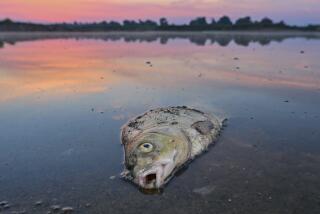Gender Benders
- Share via
A team of Dutch scientists reported that chemicals and other human waste dumped into the environment can cause sex changes in wildlife, at least in fish. Exposing carp to a chemical found in sewage caused their sex organs to atrophy, and some male fish developed female sex organs. Researchers at the TNO-Nutrition and Food Research Institute exposed the young fish to the chemical 4-tert-pentyphenol, as well as estrogen. Both substances caused the male fish to develop an oviduct, which female fish use to lay eggs. The report published in the journal Nature said the chemicals are responsible for “feminizing” animals, including fish and alligators. Some researchers believe the same effect could be causing the declining fertility in human males reported in some European cities.
Reindeer in Peril
Approximately 30,000 reindeer are facing starvation in Russia’s Chukchi Peninsula because of a freak flood and subsequent hard freeze. Extensive grazing areas were swamped, then frozen over by a sudden blast of arctic air, according to Itar-Tass. The ice is now too thick for the animals to reach their food. The Emergencies Ministry dispatched helicopters and trucks to help the animals find unfrozen pasture land.
Earthquakes
A sharp temblor rocked parts of the northern Philippines, awakening delegates and journalists attending the Asia-Pacific Economic Cooperation forum meetings near Manila. No damage or injuries were reported.
Earth movements were also felt in eastern Japan, a remote area of China’s Xinjiang province, northern India’s Jammu and Kashmir state, southern Iran, western Nicaragua and the Aleutian Islands.
Early Winter
At least 12 people were killed in western Europe in a rash of car accidents following unseasonably early snowstorms and torrential rains. Hardest hit were northern England and Scotland, where blizzards left thousands of people without power, and blocked roads with up to eight feet of snow.
Five people were killed and more than 100,000 homes were left without power by a powerful winterlike storm that raged across the Pacific Northwest. The victims died when their home was swept down a hillside in one of several devastating mudslides across western Oregon.
Equine Cull
Seventy-six of the rare wild horses that roam North Carolina’s Outer Banks were put to death by the National Parks Service, outraging activists who had labored to save them. The horses were documented as descendants of mustangs that swam ashore from Spanish shipwrecks 400 years ago. The Parks Service took the unpopular action after it was discovered that the animals were infected with equine infectious anemia, a dangerous blood disease that could have infected the remaining 108 horses still roaming the barrier islands.
Additional Sources: Australian Bureau of Meteorology, U.S. National Hurricane Center at Miami, BBC World Service, U.S. Climate Analysis Center, U.S. Earthquake Information Center and the United Nations World Meteorological Organization.
More to Read
Sign up for Essential California
The most important California stories and recommendations in your inbox every morning.
You may occasionally receive promotional content from the Los Angeles Times.












